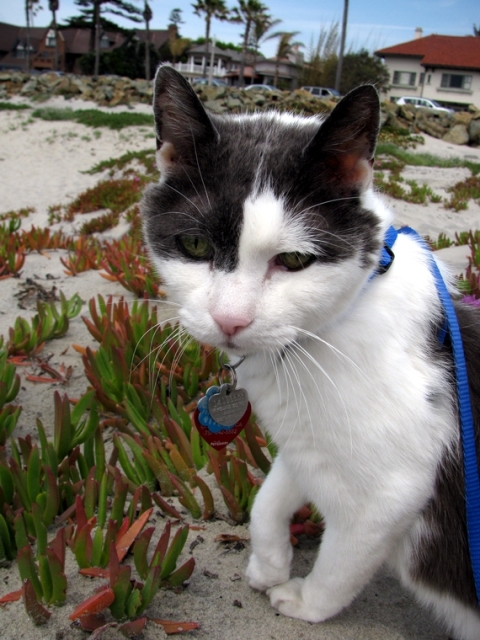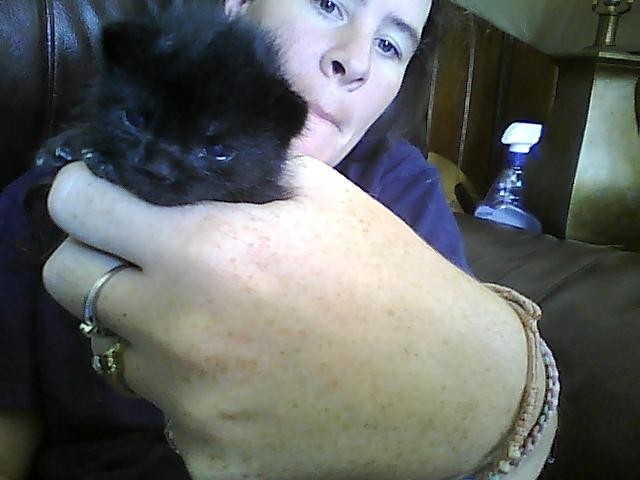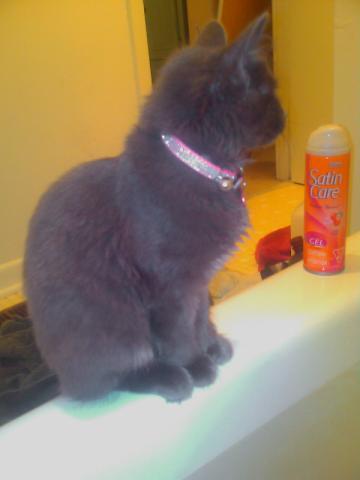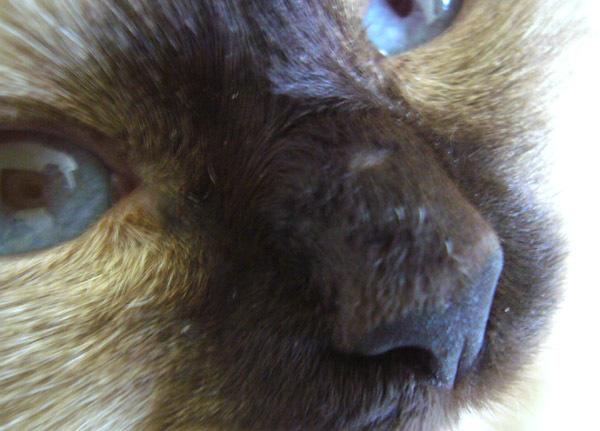Questionhi i have two female cats that were strays and they are getting ready to get spayed next week. i am so scared that something will happen to them. my friend's cat died after she had her surgery. i was wondering if it is safe ? they are my babies. i also was wondering if anyone knows a good no kill shelter in Florida that will pick up up this stray. i really bonded with her and i want her to have a chance to be adopted she doesn't deserve to be outside. please if anyone knows a no kill shelter in Florida that is good please let me know. thank you !!!!
AnswerChristina,
Unfortunately I'm not able to offer much help in the area of finding you a good no kill shelter in Florida for the stray kitty you've been caring for, you may find that your local animal control shelter, SPCA or veterinary clinics are aware of rescue organizations that might have a spot for this kitty or be able to find one in the foreseeable future.
I'm not sure whether your friend's cat died under anesthesia or during her recovery at home after the surgery so I really can't offer much of an opinion with regards to that situation. I can certainly understand your concerns around the risks of anesthesia during the spay surgeries that you have coming up for your girls and in all honesty it's important to know that when you put anyone, person or pet under anesthesia there is a small risk that they will have a negative or even fatal reaction to the anesthesia even with the best possible care and most advanced medical equipment available to the medical staff. My vet has been in practice for some time now and according to her she's only lost a couple of cats under anesthesia and in one case the cat had a congenital heart defect that wouldn't have been diagnosed with routine screening prior to surgery. There are a few things that you can do to help reduce the risks that your girls face under anesthesia:
1) Make sure that your veterinarian does a complete physical exam on both of the cats prior to them being hospitalized for their surgery. Your vet will need to do a head to toe exam of your kitty which usually starts at the head of the animal and works backwards. The vet will look into the cat's mouth to see what condition her teeth are in (the condition of a cat's teeth is a general indication of overall health just as it is in people) and your vet will also listen to your cat's heart and lungs as well as feeling her internal organs to see if there's anything concerning. If the vet finds something that isn't within the normal range or your kitty seems sick the vet may need to do further tests to diagnose the specific issue - in most cases a kitty that isn't 100% healthy should not undergo surgery until they are healthy again.
2) Your vet can perform blood tests that will help give him/her a general overview of how all of each kitty's major organ systems are functioning. Normally a pre-anesthetic blood profile provides crucial information about how the cat's major organ systems such as her kidneys, liver and pancreas are functioning. Obviously any major abnormalities in the blood test could indicate that the cat may not be a suitable candidate for surgery until more diagnostic tests are done to figure out exactly what's going on with her and in some cases the cat will need to be receiving treatment for their condition for awhile before they're strong and healthy enough to undergo surgery. A complete blood count (CBC) is just what it sounds like, this test tells the vet how many of each different type of blood cells your kitty has. If your kitty's red blood cell count is low she's likely anemic and probably not a good candidate for surgery until the cause of her anemia is diagnosed and treated. If your kitty's white blood cell count is high it can indicate that your kitty is fighting off an infection or that there's some sort of inflammatory process happening in her body that should be diagnosed and treated prior to surgery. The more information your vet has about each cat's overall health the better care s/he is able to provide for your cats.
3) Follow all pre-surgery directions from your veterinarian such as not allowing your girls to have access to food (and sometimes water depending on the vet's preference) after a certain time on the evening prior to surgery. The reason for this is so that the cats are guaranteed to have an empty stomach when they're anesthetized which reduces the likelihood that they'll vomit under anesthesia which is a possibility if they've got food in their tummies.
4) In most vet clinics it's standard for you to sign surgical consent forms that allow the vet to do the surgery. It's going to ease your mind substantially if you ask all of the questions that you have about the medications your kitty will receive, potential complications associated with those medications, what treatment you can expect your kitty to receive in the event of an emergency. You can also ask the veterinary staff when they expect to perform the spay surgery on each of your girls, in some vet hospitals the staff have a general idea of when the spay/neuter surgeries will wrap up for the day and they may be able to give you a ballpark time that you can call the clinic to find out how they did during their surgery. It's not a bad idea to ask if your vet places an IV catheter prior to surgery and whether or not the girls will receive IV fluids during the time that they're under anesthetic, in some clinics this is standard for all surgeries, in others this is only done if the pet has a medical issue that may make surgery more risky for them. If you'd like to give the girls the best possible chance of survival in the event of an emergency or serious complications while they're under anesthetic the veterinary staff can place an IV catheter which will give them direct access to a vein so that lifesaving medicines can be administered quickly and easily then be sure to ask for information to find out whether this is the best choice for you and your girls based on their overall health and medical history.
5) While this may seem like a foolish question to some people one of the questions I've asked the vet whenever my cats have been spayed/neutered or undergone any kind of surgery is if the cost of pain medication is included in the cost of the cat's surgery and after his/her discharge from the hospital as appropriate. I began asking this question years ago as a result of going with someone to pick their kitty up after surgery - this cat hadn't received any pain medication to help ease the discomfort of the surgery and she was confused, terrified and in serious pain as she repeatedly banged her face off of the kennel. I immediately asked the vet staff to sedate this kitty and give her pain medication at my own expense because I couldn't stand the thought of her suffering for a moment longer. We've been so lucky to find an absolutely fantastic veterinarian who uses a holistic approach to provide top quality care for our pets and when any of our pets have needed surgery she's given them pain medicine before they wake up from surgery so that they're completely comfortable (and usually a bit stoned!) and where appropriate she sends home medication for pain to be administered as prescribed for a few days at home. Since cats are typically very stoic they don't often show signs of pain or illness unless they're very sick or in a lot of pain so when they show signs of pain you know that they're in serious pain. In terms of providing the best possible pain control for cats it's usually best to give them pain medication prior to surgery or painful procedures otherwise it's very difficult to treat that pain and keep it adequately controlled. If you find that the cost of pain medication isn't included in the price you've been quoted for the spay surgery I'd strongly suggest finding another vet because as far as I'm concerned it just isn't humane to perform surgery on any living, feeling being whether they're people or pets without providing appropriate pain relief.
6) In my experience it's a good idea to give the vet staff a phone number where you can easily be reached throughout the day - this allows the veterinarian or his/her staff to contact you in the event of an emergency. The consent form that you sign for the spay surgeries on each of your girls may also provide important information about how aggressively the veterinary staff will treat complications that may happen as a result of the anesthesia or the surgery itself. If you're working in an environment where you can't answer a cell phone or take private calls it's a good idea to answer any questions that the vet staff might have about how you want the girls to be treated in the event that something unexpected happens. You may also want to ask when you can call to check up on the girls and find out how their spay surgery went because there's generally a routine as far as when surgeries are performed in most vet hospitals although if there's an emergency the surgeries might happen later on in the day than they normally would.
7) Another important way to give your girls the best possible chance of doing well after surgery is to be absolutely sure that you follow your vet's recommendations in terms of caring for the girls when they come home from the hospital. Some vet clinics will keep female pets overnight and discharge them the day after surgery so that they've had a chance to completely recover from the anesthetic before going home. If your veterinarian prefers to send your girls home on the evening of surgery there are a few things that you need to do in order to reduce the chances of the girls hurting themselves. First and foremost, even if you regularly allow your girls to go outside unsupervised this is one time where you should NOT let them out because they aren't quite themselves, their co-ordination has taken a nose dive as a result of the medications they've been given for sedation, pain control and anesthesia which might leave them more vulnerable to becoming easy prey for other pets and wild animals in your neighborhood.
8) When the girls come home from the hospital after their spay surgery it's important to remember that they haven't had access to food for just under 24 hours (if they come home on the day they've been spayed) so it's important to start feeding them slowly to avoid having them vomit. You may find that putting down small amounts of food and water for the girls every half hour or so will help to reduce the risk of the girls eating or drinking too much, too quickly. I'd suggest that you avoid kibble for a few days if you generally feed a dry cat food because a high quality canned cat food like Wellness is more easily digested and contains significantly more moisture than kibble which means that your kitty's system is less likely to be overly stressed as a result of dehydration while they're healing from their surgery. I can provide you with more information about providing your girls with the best possible nutrition so that they can live longer, healthier lives if you'd like to learn more about species appropriate, properly balanced diets for cats.
9) Keeping the girls comfortable, quiet and calm and preventing them from running around too much or jumping up onto large pieces of furniture, high shelves or appliances will help to minimize the chances that the girls will get hurt while their co-ordination and balance is affected by anesthetic and pain medications. Watch the girls closely, if they're licking their incision frequently or for long periods of time or they're trying to pull their sutures out then they may need to wear an Elizabethan or E-collar to prevent them from irritating the area around the incision.
10) In my experience it's a good idea to set a room up in your house (your bedroom is fine) where they can be temporarily confined with all of the usual necessities and creature comforts before you head out to pick the girls up from the veterinary hospital. Keeping the room quiet and dimly lit is a good idea if at all possible because that limits the amount of stimulation the girls receive which will keep them calmer - if the girls come home and they seem to be pretty laid back you can try letting them out of their safe room provided that you don't have children or adults who are unable to understand that the cats have had major surgery and need to rest quietly and take it easy for a few days. The room should be dimly lit and climate controlled with cozy places to sleep and begin their recovery from surgery. , although cats are normally very well co-ordinated and agile this is one time where they may fall off of furniture or miss jumps onto or off of pieces of furniture, window sills, etc because the medications they received prior to, during and after surgery. impair their co-ordination.
Since you've contacted me to learn more about the potential complicatins of spaying your girls and many pet parents routinely declaw their cats during their spay/neuter surgery I've taken the liberty of providing you with information about declawing and humane alternatives to this painful elective surgery. Many pet parents declaw their cats to prevent them from destroying their furniture in the belief that there isn't any other way to avoid expensive damage to their furniture and possessions, the reality is that cats are highly intelligent and more trainable than most people realize - with a bit of consistent training, patience and some appropriate surfaces to scratch (sturdy scratch pads, scratch posts, scratch mats, etc) they can be trained to leave your furniture alone. Many veterinarians don't take the time to inform pet parents about what's actually involved when declawing a cat. I know that you didn't contact me asking for information about declawing, however I do believe that declawing a cat isn't something that should be done without pet parents having access to information about this surgery and the potential adverse effects so that all pet parents could be aware of what this procedure entails and the fact that there are other alternatives.
The information I'm sending out is meant to be a form of humane education. This isn't about judging other pet parents, it's about allowing pet parents to learn more about their cats and reduce the risk of serious medical and behavioral issues in the future. In my years of fostering and rehabilitating countless cats of all ages with a variety of behavioral issues as well as rescuing stray and abandoned cats and kittens I've learned that most pet parents don't want to deal with urine/feces on their carpeting, bedding or other household items. Most pet parents also don't want to deal with the legal liability that goes along with housing a cat that bites or scratches people. I really believe that all cats deserve a loving forever family to care for them throughout their entire life and it's important to me that as many kitty caregivers as possible have happy, fulfilling times with their cats as possible so I've chosen to include more information for cat parents about how they can have the most rewarding relationship possible with their cats/kittens.
I was disturbed to find out how few veterinarians are quick to declaw a cat without taking the time to help cat caregivers understand exactly what the surgery involves, the risks associated with the surgery and the potential for serious behavioral, emotional and physical problems to emerge sometimes years after the surgery was performed. In any situation where we're making major decisions I really believe that it's important for pet parents to make an informed decision once they have as much information about declawing as possible and they've been made aware of training and other humane alternatives to this cosmetic surgery.
I think it's very important that pet parents understand how important claws are to a cat's physical and psychological well-being. Cats are highly intelligent and very trainable once you discover what motivates your cat or kitten - two of my three resident cats are motivated by food rewards, they've learned that exercising claws must be confined to scratch posts and pads and I've managed to teach them several basic dog obedience commands, my oldest resident cat will do just about anything for praise and pets and she's also learned basic commands and the places where she's permitted to exercise her claws. My hope for the future is that all veterinarians will be ethical enough to educate caregivers about declawing and the risks associated with this surgery and finally that pet parents will have an opportunity to learn basic training techniques so that this surgery isn't nearly as commonly performed as it is today.
Maybe some pet parents will give serious thought to this issue and try training their next cat or kitten to use scratch posts/pads and cat trees instead of exercising their claws on your furniture so that declawing is treated as a last resort. In North America the leading cause of death in cats is euthanasia performed as a direct result of behavioral issues. Many cats that become aggressive towards other pets and members of their human family or develop problems with house soiling face a number of bleak options. Some of these cats are abandoned, abused, relinquished to shelters or rescue groups or euthanized by private veterinarians.
Contrary to popular belief cats don't actually sharpen their claws when they sink their claws into furniture. Cats are actually stretching and strengthening muscles in their shoulders, back and front paws when they're clawing their scratch post or piece of furniture. Cats are very territorial animals and they communicate with each other by marking objects throughout their territory with their unique scent. When a cat 'sharpens' they're actually using scent glands located in their paws to leave a scented business card of sorts for the next cat that comes along. Cats also have scent glands in their face and the anal glands are also used for scent marking, they're located inside the cat's body on either side of the anus. Each cat's scent provides other cats with a substantial amount of information about them for other cats to take in including age, sex, reproductive status, diet and health problems.
Declawing is a cosmetic surgery for cats that's often compared to amputating human fingers at the first joint, but the surgery is somewhat more complex than that. Humans don't retract their finger tips, cats do, this means that declawing involves amputating tendons, ligaments, bone, soft tissue and the cat's nails. This is a very painful surgery - the American Veterinary Medical Association (AVMA) recommends that cats who are to be declawed be given a long acting pain reliever after they're sedated for surgery. Before the surgery begins the AVMA recommends administering nerve blocks at multiple sites in the cat's paws to minimize pain levels immediately following surgery. It's also recommended that cats that have been declawed be sent home on a strong narcotic like Fentanyl administered in patch form.
It has been my experience that cats who have been declawed are more likely to have certain behavioral issues including litter box avoidance, biting or temperament changes. I suspect that the litter box avoidance is a result of phantom limb pain, this disorder is known to occur in human beings that have lost a limb. Since cats are quite smart my guess is that the litter box issues are a direct result of the cat trying to find a less painful place to use the toilet. Declawed cats often bite when they're anxious, fearful or overly dominant (which happens in a small percentage of cases) because the cats feel that they've lost their early warning system which eventually leads to the cat striking out defensively and biting people when they become aggitated. Cats don't normally defend themselves by biting, in fact they will generally opt to run away from a threat whenever possible, if they're cornered they'll use their claws on a potential threat and biting is usually a last resort. In my experience cats are actually quite polite with most people when they're attempting to communicate their desire to be left alone. Normally cats will start off their defense by running away and hiding. If they can't hide from a potential threat then they will begin hissing, growling and making themselves appear larger by arching their backs and having their fur stand on end. If things escalate to the point where the cats feel that they have to actually strike out defensively they'll start by swatting the offending cat or person with carefully sheathed claws, as the threat intensifies the cat will gradually increase their defensive response by scratching the cat or person that's bothering them. Cats that have been declawed will often forego the early steps in their defenses and move straight in to biting when they feel threatened. In general when cats living in stray/feral colonies the cats will usually defend their territory, determine their place within the colony's social hierarchy and solve their disputes through the use of posturing rather than taking the risk that goes along with physical fights. Intact male cats will defend their territory and discuss mating rights by engaging in displays that include caterwauling, growling and a staring contest of sorts - the winner is the cat who backs away first.
Some cats undergo significant changes in temperament when they come home after being declawed. I recently helped out a woman whose kittens had been the best of friends prior to their surgery and when they came home they couldn't be in the same room without a fight ensuing. I suspected that the fights were related to the post operative pain and the veterinarian not providing appropriate pain relief after the declaw surgery. I recommended that the kittens' caregiver pick up a homeopathic remedy called Bach's Rescue Remedy which is a blend of flower essences that's designed to calm and reassure and head to the nearest vet clinic and request pain medications to alleviate their pain after surgery and once she gave the girls their remedy and pain relief to her surprise the cats calmed down and became close friends again almost immediately. If you have any further cat related questions or concerns please don't hesitate to contact me again - I will do my absolute best to help you and your cats out.

 18 year old cat has blood clots in urine
Question
Tucker
My 18 year old male neutered cat is hyp
18 year old cat has blood clots in urine
Question
Tucker
My 18 year old male neutered cat is hyp
 teething
Question
wally
i have a orphened kitten i have b
teething
Question
wally
i have a orphened kitten i have b
 urgent cat problem
Question
kitty aka chanel
my cat is about 7 mont
urgent cat problem
Question
kitty aka chanel
my cat is about 7 mont
 Bald spot on my cats nose
Question
bald spot
Hello Jessica,
Today I notic
Bald spot on my cats nose
Question
bald spot
Hello Jessica,
Today I notic
 Killing Fleas on Persians
Question
Chloe Ruth
I simply cannot kill off the
Killing Fleas on Persians
Question
Chloe Ruth
I simply cannot kill off the